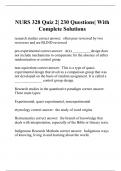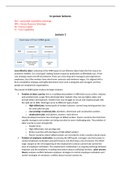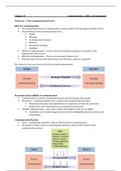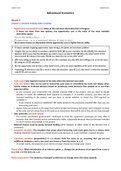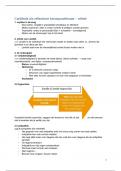Lecture 3
Citizenship as Privilege, or the Difference that Alienage
Makes: Welfare Rights
What consequences does it have for the rights that you can enjoy on the territory of the country
that you’re living if you don’t have the formal citizenship of that state?
In theory rights for persons can be based on different grounds:
- Nationality
- (Other forms of) membership of the national community (eg legal status, community ties
etc)
- Personhood, we are humans so we have the right to enjoy human rights
Questions of this class
On what basis do people get social rights in international human rights law?
Does International human rights law ‘carve out a zone of protected personhood’ as Da Lomba
argues?
Why this focus on social rights?
With regard to de distribution of scarce resources the question: who belongs? Comes especially
to the core.
For states it might be easy to say that everybody on the territory has the right to freedom of
expression, for example, no resource will be actually necessary for providing this right to
everybody. With social rights: rights to social security, social benefits, education, healthcare etc.
this is a different story: states actually have to provide certain resources to persons, so the
question is who belongs to this territory.
In addition, social rights for migrants are often used as an instrument for immigration control.
For example: by deterring arrival of new migrants (preventing ‘benefit tourism’) or by
preventing integration into the host society, in order to facilitate expulsion.
The question is: to what extend is this allowed under international law, can states use social
rights actually as an instrument for immigration control? By not providing certain social benefits
to certain categories of immigrants or non-nationals states try to deter these immigrants. They
try to prevent the immigrants from coming to their country and also they try to prevent
integration when immigrants are in the host country, because this could make expulsion easier.
Example: In The Netherlands asylum seekers do not have the right to just normal social
assistance benefit, but they are only entitled to accommodation and some food and clothing that
is provided in special reception centres. In this way The Netherlands tries to prevent that they
develop all kinds of social ties in The Netherlands, which would make it more difficult to expel
them.
Order of discussion
- We will have a look in a number of social rights laid down in International Human Rights
Law IHRL
i) Refugee Convention
ii) European Social Charter (ESC)
iii) European Convention on Human Rights (ECHR)
iv) International Covenant on Economic, Social and Cultural Rights (ICESCR)
- Recent developments: new basis for rights of migrants?
- Assignment
, 1951 Refugee Convention
The Refugee Convention has a limited personal scope, in order to fall in the personal scope of the
Refugee Convention you have to have: a well-founded fear of being persecuted for reasons of
race, religion, nationality, membership of a particular social group or political opinion, who is
outside the country of his nationality and is unable or, owing to such fear, is unwilling to avail
himself of the protection of that country Article 1(A)(2). If you fulfil these conditions you are a
refugee and you fall under the scope of the Refugee Convention.
The refugee convention provides protection against refoulement, so you cannot be expelled to a
country where you might be in danger but it also provides a few substantive rights:
- Housing article 21: As regards housing, the Contracting States, in so far as the matter is
regulated by laws or regulations or is subject to the control of public authorities, shall
accord to refugees lawfully staying in their territory treatment as favourable as possible
and, in any event, not less favourable than that accorded to aliens generally in the same
circumstances.
What is important here is that you see with regards to an important social right: the right
to housing, refugees are entitled to this right but only refugees who are lawfully staying
in the territory.
- The same condition applies to the right to public relief, which can be understood as
social assistance. Article 23: The Contracting States shall accord to refugees lawfully
staying in their territory the same treatment with respect to public relief and assistance
is accorded to their nationals. If you are lawfully staying in the territory you have the
right to equal treatment as the nationals but if not you are not entitled to social
assistance under the refugee convention.
Certain important social rights are limited to refugees that are lawfully staying in the territory.
Article 17 Wage-earning employment or access to the labour market, again this right is limited
to refugees that are lawfully staying in the territory.
The second paragraph is also interesting: in any case, restrictive measures imposed on aliens or
the employment of aliens for the protection of the national labour market shall not be applied to
a refugee (..) who fulfils one of the following conditions:
A) He has completed three years residence in the country; (any kind of residence is enough,
no need to be lawfully)
B) He has a spouse possessing the nationality of the country of residence;
C) He has one or more children possessing the nationality of the country of residence
With regard to access to the labour market we see that this is not reserved for refugees with
legal residence, but also certain categories of refugees with a strong link/strong social ties in the
territory in which they live.
European Social Charter (revised)
The personal scope of the European Social Charter is limited; this is laid down in the appendix.
Without prejudice to article 12, paragraph 4, and article 13, paragraph 4, the persons covered by
Articles 1 to 17 and 20 to 31 include foreigners only in so far as they are nationals of other Parties
lawfully resident or working regularly within the territory of the Party concerned (…).
Two kinds of limitations, you have to be a national of an other contracting party and you have to
be lawfully resident or working regularly (working with a employment permit).
Without prejudice to article 13:
The right to social and medical assistance: with a view to ensuring the effective exercise of the
right to social and medical assistance, the Parties undertake:
4. To apply the provisions of this article on an equal footing with their nationals to nationals of
other parties lawfully within their territories (…)
The personal scope is still very limited, again you have to be a national of another Party and you
have to be lawfully within the territory.
Citizenship as Privilege, or the Difference that Alienage
Makes: Welfare Rights
What consequences does it have for the rights that you can enjoy on the territory of the country
that you’re living if you don’t have the formal citizenship of that state?
In theory rights for persons can be based on different grounds:
- Nationality
- (Other forms of) membership of the national community (eg legal status, community ties
etc)
- Personhood, we are humans so we have the right to enjoy human rights
Questions of this class
On what basis do people get social rights in international human rights law?
Does International human rights law ‘carve out a zone of protected personhood’ as Da Lomba
argues?
Why this focus on social rights?
With regard to de distribution of scarce resources the question: who belongs? Comes especially
to the core.
For states it might be easy to say that everybody on the territory has the right to freedom of
expression, for example, no resource will be actually necessary for providing this right to
everybody. With social rights: rights to social security, social benefits, education, healthcare etc.
this is a different story: states actually have to provide certain resources to persons, so the
question is who belongs to this territory.
In addition, social rights for migrants are often used as an instrument for immigration control.
For example: by deterring arrival of new migrants (preventing ‘benefit tourism’) or by
preventing integration into the host society, in order to facilitate expulsion.
The question is: to what extend is this allowed under international law, can states use social
rights actually as an instrument for immigration control? By not providing certain social benefits
to certain categories of immigrants or non-nationals states try to deter these immigrants. They
try to prevent the immigrants from coming to their country and also they try to prevent
integration when immigrants are in the host country, because this could make expulsion easier.
Example: In The Netherlands asylum seekers do not have the right to just normal social
assistance benefit, but they are only entitled to accommodation and some food and clothing that
is provided in special reception centres. In this way The Netherlands tries to prevent that they
develop all kinds of social ties in The Netherlands, which would make it more difficult to expel
them.
Order of discussion
- We will have a look in a number of social rights laid down in International Human Rights
Law IHRL
i) Refugee Convention
ii) European Social Charter (ESC)
iii) European Convention on Human Rights (ECHR)
iv) International Covenant on Economic, Social and Cultural Rights (ICESCR)
- Recent developments: new basis for rights of migrants?
- Assignment
, 1951 Refugee Convention
The Refugee Convention has a limited personal scope, in order to fall in the personal scope of the
Refugee Convention you have to have: a well-founded fear of being persecuted for reasons of
race, religion, nationality, membership of a particular social group or political opinion, who is
outside the country of his nationality and is unable or, owing to such fear, is unwilling to avail
himself of the protection of that country Article 1(A)(2). If you fulfil these conditions you are a
refugee and you fall under the scope of the Refugee Convention.
The refugee convention provides protection against refoulement, so you cannot be expelled to a
country where you might be in danger but it also provides a few substantive rights:
- Housing article 21: As regards housing, the Contracting States, in so far as the matter is
regulated by laws or regulations or is subject to the control of public authorities, shall
accord to refugees lawfully staying in their territory treatment as favourable as possible
and, in any event, not less favourable than that accorded to aliens generally in the same
circumstances.
What is important here is that you see with regards to an important social right: the right
to housing, refugees are entitled to this right but only refugees who are lawfully staying
in the territory.
- The same condition applies to the right to public relief, which can be understood as
social assistance. Article 23: The Contracting States shall accord to refugees lawfully
staying in their territory the same treatment with respect to public relief and assistance
is accorded to their nationals. If you are lawfully staying in the territory you have the
right to equal treatment as the nationals but if not you are not entitled to social
assistance under the refugee convention.
Certain important social rights are limited to refugees that are lawfully staying in the territory.
Article 17 Wage-earning employment or access to the labour market, again this right is limited
to refugees that are lawfully staying in the territory.
The second paragraph is also interesting: in any case, restrictive measures imposed on aliens or
the employment of aliens for the protection of the national labour market shall not be applied to
a refugee (..) who fulfils one of the following conditions:
A) He has completed three years residence in the country; (any kind of residence is enough,
no need to be lawfully)
B) He has a spouse possessing the nationality of the country of residence;
C) He has one or more children possessing the nationality of the country of residence
With regard to access to the labour market we see that this is not reserved for refugees with
legal residence, but also certain categories of refugees with a strong link/strong social ties in the
territory in which they live.
European Social Charter (revised)
The personal scope of the European Social Charter is limited; this is laid down in the appendix.
Without prejudice to article 12, paragraph 4, and article 13, paragraph 4, the persons covered by
Articles 1 to 17 and 20 to 31 include foreigners only in so far as they are nationals of other Parties
lawfully resident or working regularly within the territory of the Party concerned (…).
Two kinds of limitations, you have to be a national of an other contracting party and you have to
be lawfully resident or working regularly (working with a employment permit).
Without prejudice to article 13:
The right to social and medical assistance: with a view to ensuring the effective exercise of the
right to social and medical assistance, the Parties undertake:
4. To apply the provisions of this article on an equal footing with their nationals to nationals of
other parties lawfully within their territories (…)
The personal scope is still very limited, again you have to be a national of another Party and you
have to be lawfully within the territory.


